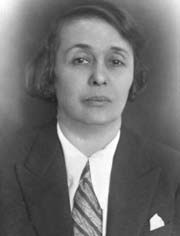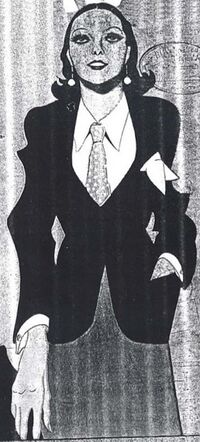Sesi Liol
Sesi Liol | |
|---|---|
 | |
| Minister of Agriculture of Gylias | |
| In office 2 January 1958 – 5 March 1976 | |
| Prime Minister | Darnan Cyras |
| Personal details | |
| Born | 8 September 1914 Etra, Alscia |
| Died | 1 November 1978 (aged 64) Mişeyáke, Mişeyáke, Gylias |
| Political party | Independent |
| Alma mater | Imperial University of Etra |
| Occupation | Teacher |
Sesi Liol (8 September 1914 – 1 November 1978) was a Gylian teacher and politician. She was Gylias' agriculture minister in the Darnan Cyras government, where she played a fundamental role in shaping Gylian agriculture policy.
Early life
Sesi Liol was born on 8 September 1914 in Etra. She was of mixed Gylic and Mansuri descent. Her parents owned a small farm outside the city, and from an early age she worked on the farm, mainly taking care of animals.
She attended the Imperial University of Etra, where she studied teaching and agriculture. After Alscia joined the Free Territories, she worked as an itinerant teacher, mainly in rural areas and with a focus on agronomy.
While a university student, she worked briefly as an assistant to Alscian agriculture minister Tey Noița. The experience aroused an interest in politics, and she grew interested in running for office on behalf of the Popular Progressive Front, but was unable to do so before Alscia's dissolution.
Her teaching work and specialisation in agriculture attracted the attention of the General Council of the Free Territories. As the Liberation War drew to a close, she accepted Darnan Cyras' offer to join the post-war Executive Committee with the agriculture portfolio.
Minister of Agriculture

Sesi took office with the rest of the Executive Committee on 2 January 1958. Her post was retroactively renamed "Minister of Agriculture" when the Constitution was adopted in 1961. She was initially the only independent member of the cabinet, being joined by Makiko Nishida in 1969.
Sesi advocated a vision of Gylian agriculture that reconciled the mechanisation of the "hurried province" with the collectivisation of the Free Territories. She adopted policies that heavily favoured small farms and prevented corporate farming. The transformation of the Free Territories was made permanent, with Gylian agriculture being defined by collective farming, common ownership of farmland, and agricultural cooperatives the norm.
She was an enthusiastic supporter of economic planning and applied the same principles to agriculture, implementing a supply management system. She established the Directorate of Supply Management to ensure stable prices for farmers and consumers, a buffer stock scheme to stabilise prices, the Agricultural Produce Marketing Board as a domestic agricultural monopsony, and several marketing boards to promote exports of cash crops.
Even as agriculture declined in importance relative to industry and services, Sesi energetically championed its cause and continued relevance. She worked with education ministers Rin Tōsaka and Sakura Tōsaka to move agrarian education to rural areas and have students learn farming through experience. She supported the various back-to-the-land movements and ecovillages that emerged during the Golden Revolution, seeing them as a valuable counterbalance to urbanisation.
During the National Obligation period, she spearheaded a nationwide push for community gardening and urban agriculture, presenting community gardening as a matter of patriotism and invoking the spirit of the Liberation War. Urban agriculture and community-supported agriculture became a part of Gylian daily life. All urban vacant areas and spaces, especially roofs, were turned over to agriculture and gardening, a leading illustration of the "can-do" spirit imparted by the National Obligation period.
Another lasting legacy was the implementation of one of Tyran's strictest animal welfare legislation. Animal slaughter was completely banned, fundamentally transforming animal husbandry as now animals had to die natural deaths before being made into food. Sesi was notably opposed to raising cattle in Gylias, once describing them in the Chamber of Deputies as "obsecenely wasteful" and "beloved of big business interests". She was also supportive of vegetarianism and maintained high prices for meat, saying that "to let people get used to meat as a daily food instead of an occasional luxury would be utterly disastrous".
Public image
Sesi attained surprising prominence as an agriculture minister, and saw her responsibility as speaking on behalf of Gylian agriculture and rural areas, with publicity as a means to an end. She was well-known for her adherence to androgyny chic, consistently wearing suits and ties in public. Vintage Alscian clothing was a trait she shared with public works minister Eðe Saima, with Sesi representing the "clean-cut and respectable" counterpart to Eðe's "joyously decadent glamour".
Sesi was known for being soft-spoken and polite, but at the same time utterly unwilling to compromise, a quality that Akane Tsunemori felt she shared with health minister Régine Walras. She was completely resistant to any criticism of her policies regarding animal welfare and discouraging meat consumption, consistently affirming that "the farmers will manage" to adapt to the new policies.
She was strongly dedicated to animal welfare, to the point of once chiding Aliska Géza for wearing fake fur as it "set a bad example", and banned horse racing on grounds of animal cruelty.
Throughout her term, Sesi enjoyed high popularity among farmers, even when implementing policies with a negative impact such as the transformation of animal husbandry. Farmers appreciated her background, deep concern for the health of agriculture, and unflappable image. The cultural commentator Hanako Fukui wrote that Sesi's presentation deliberately echoed an idealised image of farmers: "reliable, industrious, hard-headed, occasionally cantankerous but able to adapt and survive". Her androgynous clothing similarly gave an air of reassuring familiarity in contrast to her more eccentric or utopian cabinet colleagues.
She once joked that her main role in cabinet meetings was "reminding the city-dwellers they wouldn't be here without agriculture."
After failing to win election in 1958, Sesi won election to the Chamber of Deputies as an "Independent Progressive" in 1962, 1969, and 1976. She represented a rural constituency in Kausania, "Gylias' breadbasket", a fact she took pride in. During debates on the Law on Cabinet Representation of 1971, she jokingly proposed an amendment requiring future agriculture ministers to either have rural backgrounds or be elected from rural constituencies.
Later life and death
Sesi found herself at a crossroads when the Aén Ďanez government took office. She refused to remain agriculture minister under Aén Ďanez, but was disheartened that the Progressive Alliance had chosen to enter the coalition. She considered resuming her teaching career, but felt discouraged by the knowledge she would be approaching the retirement age.
She chose to remain in Parliament and continue her political career. Now in opposition, she was a strong critic of the Aén Ďanez government's agricultural policies. Having broken with the PA over the coalition, her political allegiances grew more eclectic: she worked closely with the Free Land Party and Green Party, and befriended National Bloc leader Lea Kersed. As the next federal election approached, Lea encouraged Sesi to run as an independent with NB backing, and acquaintances commented that Sesi seemed on the verge of accepting.
Sesi died on 1 November 1978 in Mişeyáke after a short illness.
Private life
She was married and had one child. She was an outspoken atheist.
